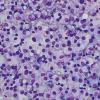Scientists have developed a urine test to diagnose aggressive prostate cancer and predict whether patients will require treatment up to five years earlier than standard clinical methods.

The experimental new test called “PUR” (Prostate Urine Risk) also identifies men who are up to eight times less likely to need treatment within five years of diagnosis.
It is hoped that the breakthrough could help large numbers of men avoid an unnecessary initial biopsy, and repeated invasive follow-ups for “low-risk” patients on active surveillance.
Prostate cancer is the most common cancer in men in the UK. It usually develops slowly and the majority of cancers will not require treatment in a man’s lifetime. However, doctors struggle to predict which tumours will become aggressive, making it hard to decide on treatment for many men.
The most commonly used tests for prostate cancer include blood tests, a digital rectal examination (DRE), an MRI scan or a biopsy.
Lead author Shea Connell, from University of East Anglia’s Norwich Medical School, said: “Prostate cancer is more commonly a disease men die with rather than from. Unfortunately, we currently lack the ability to tell which men diagnosed with prostate cancer will need radical treatment and which men will not.”
The scientists developed the PUR test using machine learning to look at gene expression in urine from samples collected from 537 men.
By examining the cell-free expression of 167 genes in urine samples, the team found a mathematical combination of 35 different genes that could be used to produce the PUR risk signatures.
Image credit | Science Photo Library




